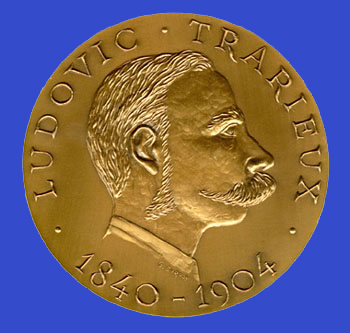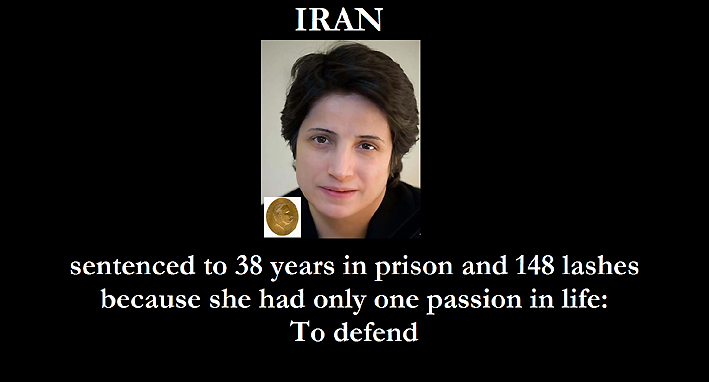Prix
International des droits de l'homme Ludovic-Trarieux 2018
Since 1984
“The
award given by lawyers to a lawyer”
“She defended Iranian Women who removed their Head- Coverings, Now She is
a Convict"
New York Times
Nasrin Sotoudeh
who was the lawyer for women’s rights activists who defied Iran’s head-covering rule
, journalists , politicians and legal colleagues
sentenced to 38 years in prison and 148 lashes
Article 134 of Iran’s Penal
Code allows judges to impose a higher
sentence than the maximum statutory requirement when a defendant faces more
than three charges. In Nasrin Sotoudeh’s
case, the judge, Mohammad Moghiseh, applied the
maximum statutory sentence for each of her seven charges and then added another
four years to her total prison term, raising it from the statutory maximum of
29 to 33 years, in addition to the five years pronounced elsewhere, a total of
38.
However, it is possible that Nasrin Sotoudeh has to serve, still under the Iranian Penal
Code, only the longest sentence for one of the (trumped-up) offenses for which
she was prosecuted. In this case the sentence would only be 10 years. In this case,
the sentence would only be 10 years. Or more surely of 15 years, due to the
distinct and previous undefended sentence of 5 years remaining. But damned be
the evil mathematics to which the ayatollahs summon us. Whatever the quantum,
one more day in prison would be too much.
It is to be hoped that before this
international mobilization will succeed in yielding the delusional justice of
the deleterious Iran.
We therefore call all men of good
will in the world, regardless of their convictions and their religion, to ask
for immediate and unconditional release of Nasrin
Sotoudeh and in advance we express our deep gratitude to them.
Bertrand FAVREAU.
Nasrin Sotoudeh
”International
Human Rights Prize Ludovic –Trarieux 2018”
Thirty-three years after Nelson Mandela
, Prizewinner in 1985 when in jail, by a Jury of 25 european
lawyers, representing main European bars and major lawyers organizations
fighting for human rights : Amsterdam, Berlin, Bordeaux Brussels, Geneva,
Paris, Roma, Luxemburg, European Bar Human Rights Institute (IDHAE) and of
Union Internationale des Avocats (UIA meeting in Paris Bar Association Mainroom, launched an appeal aux autorités
to release immediately and without
conditions.
As a lawyer, in 2003, Nasrin
Sotoudeh Langroudi, 55, became an active member of the Center for
the Defense of Human Rights and the Society for the Protection of the Rights of
Children. She specialized in women’s and children’s rights while continuing to
write articles addressing these issues.
She was first arrested in September 2010 on an array of charges including
"propaganda against the state" and "cooperating with the Center
for the Defense of Human Rights."
On January 9, 2011 she was sentenced
to 11 years in prison
and an additional 20-year
ban on practicing law also bars her from traveling outside the country once her
sentence is complete. On September 2011,
an appeals court reduces Sotoudeh’s sentence from 11
years to 6, and her ban from working as a lawyer is reduced from 20 to 10. After three years, in September 18, 2013, she
was released from Evin Prison, on the eve of
President Rouhani’s first visit to the United States.
On October 18, 2014: Branch Two of the Lawyers’Disciplinary Court at the Iranian Bar Association
bans Sotoudeh from her law practice for three years. On October 21, Sotoudeh
begins a sit-in in every day front of the Bar Association to protest the ruling
banning her from her law practice. Finally in June 2015, her license to
practice law is reinstated but not for political or medias cases.
Since 2017, Nasrin Sotoudeh
has worked as a defense attorney for
women charged with violating Iran’s compulsory veiling law. Subsequently, Nasrin Sotoudeh was abruptly re-arrested on June 13, 2018
and taken to Evin prison where she is informed she
has been sentenced to five years in prison after being convicted in absentia on
unspecified charges. She started a hunger strike on 25 August in protest at the
Iranian authorities’harassment of her family and
friends. Her husband, Reza Khandan, was arrested on
September 4th, 2018 .
Nasrin Sotoudeh, a heroin of our time
Nasrin Sotoudeh Langroudi,
55, was born in 1963 in Tehran and a mother of two, received a master's in
international law from Shahid Behshti
University in 1989. Two years later, she was one of the founding editorial
board members and contributors to the nationalist-religious monthly Daricheh Goftegoo. For
International Women's Day that year, she organized a collection of articles by
and interviews with leading Iranian female activists, which the magazine's
editor-in-chief refused to run.
After completing her Master’s Degree in International
Law at Shahid Beheshti
University, Sotoudeh passed the bar exam in 1995 but was not permitted to
practice law for another eight years. When Sotoudeh was finally granted a law
license in 2003, she became an active member of the Center for the Defense of
Human Rights and the Society for the Protection of the Rights of Children.she specialized in women’s and children’s rights
while continuing to write articles addressing these issues. Her clients have
included women’s rights activists, among them the organizers of the grassroots,
door-to-door One Million Signatures Campaign; journalists such as Eisa Sharkhiz; politicians such
as Hashmat Tabarzadi, head
of Iran’s banned opposition group the Democratic Front; and legal colleagues
such as Nobel Peace Prize laureate Shirin Ebadi. She
has represented many Iranian opposition activists arrested in the crackdown
following the June 12, 2009 presidential elections. She has also prominently
defended prisoners sentenced to death for crimes committed while they were under 18.
Sotoudeh was first arrested in June 2008 among a group
of female activists preparing to attend a commemoration of a national day of
solidarity for Iranian women. She was briefly detained and then tried the
following February for disturbing the peace. No sentence was announced.
In the run-up to the June 2009 presidential election,
she helped found the Coalition of Women's Rights Movement and brought women's
demands to the attention of the candidates.
In 2010, security forces raided her home and office
and her assets were frozen. In September, she was summoned to Tehran's Evin Prison and arrested on an array of charges including
"propaganda against the state" and "cooperating with the Center
for the Defense of Human Rights." She was denied bail, access to her
lawyer, and the right to family visits. In response to her treatment, on
October 6 she began the first of at least three hunger strikes that have lasted
as long as three weeks.
On January 9, 2011 Branch 26 of the Revolutionary
Court sentenced Sotoudeh to 11 years in prison -- one year on the propaganda
charge and a decade for "acting against national security" and
"violating hijab in a filmed speech." The additional 20-year ban on
practicing law also bars her from traveling outside the country once her
sentence is complete. She remains in Evin Prison,
held in Ward 209, which is under the control of the Islamic Republic's Ministry
of Intelligence. She is reportedly kept in solitary confinement for much of the
time and is in ill health.
On September 2011, an appeals court reduces Sotoudeh’s sentence from 11 years to 6, and her ban from
working as a lawyer is reduced from 20 to 10. The ban is later reduced to three
years and then nine months. Since nine months of the suspension had already
passed by then, her license is effectively reinstated.
From October to December 2012: Nasrin
Sotoudeh goes on a hunger strike to protest her prison conditions and a travel
ban placed on her 12-year-old daughter Mehraveh.Her
husband reports that she had lived entirely on salt water and sugar water, and
that her weight had dropped to only 95 pounds. She spent 17 days in solitary
confinement as punishment for her hunger strike.
On September 18, 2013, sdhe
was released from Evin Prison, on the eve of
President Rouhani’s first visit to the United States.
On October 18, 2014: Branch Two of the Lawyers’Disciplinary Court at the Iranian Bar Association
bans Sotoudeh from her law practice for three years. On October 21, Sotoudeh
begins a sit-in in front of the Bar Association to protest the ruling banning
her from her law practice.
On December 10, 2014: On Human Rights Day and the 50th
day of her sit-in, Sotoudeh is again arrested and detained, but released hours
later.
In June 2015, her license to practice law is
reinstated.
Nasrin Sotoudeh has recently worked as a
defense attorney for women charged with violating Iran’s compulsory veiling
law. During an outbreak of protests in December 2017 and January 2018, a number
of women participating in the Girls of Revolution Street Protest were arrested
for removing their headscarves in public to demonstrate against the mandatory
dress code.
Subsequently, Nasrin
Sotoudeh was abruptly re-arrested on June 13, 2018 at her home in Tehran, and
taken to Evin prison where she is informed she has
been sentenced to five years in prison after being convicted in absentia on
unspecified charges. She had recently criticized the country’s judiciary. In
protest, she has reportedly refused to hire a defense attorney for herself. The charges against her stem from her work defending women who have
been prosecuted for peacefully protesting against the abusive, discriminatory
and degrading practice of forced veiling (hijab). She started a hunger
strike on 25 August in protest at the Iranian authorities’harassment
of her family and friends. Her husband, Reza Khandan,
was sentenced to five years in jail for conspiring against national security
and one year for propaganda against the system, on January 23 because of his support
for the Iranian women’s campaign against forced veiling (hijab).
In 2008, Nasrin Sotoudeh was
awarded the Human Rights Prize by the International Human Rights Organization
of Italy, but was barred from leaving the country to accept the honor. She was
nominated twice for the Ludovic Trarieux prize in 2011 and also in 2012 but the
nomination was cancelled according to tha regulations
of the Prize because she was the winner of thePEN/Barbara
Goldsmith Freedom to Write Award in 2011 and a winner of the Sakharov Prize
jointly with iraniam filmmaker Jafar
Panahi, in 2012.
Since 1984, the "International Human Rights Prize Ludovic
-Trarieux” is awarded to " a lawyer, regardless of nationality or Bar, who
thoroughout his career has illustrated, by his activity
or his suffering, the defence of human rights, the
promotion of defence rights, the supremacy of law,
and the struggle against racism and intolerance in any form ".
Since 2003, the Prize is awarded every year in partnership by the Human
Rights Institute of The Bar of Bordeaux, the Human Rights Institute of the Bar
of Paris, the Human Rights Institute of The Bar of Brussels, l'Unione forense per la tutela dei diritti
dell'uomo (Roma), Rechtsanwaltskammer
Berlin, the Bar of Luxemburg, the Bar of Geneva, the Bar of Amsterdam as well
as the Union Internationale des Avocats (UIA), and
the European Bar Human Rights Institute (IDHAE) whose members are the biggest european law societies fighting for human rights. It is
presented every year in a city that is home to one of the member Institutes.
It is the oldest and most prestigious award given to a lawyer in the
world, commemorating the memory of the French lawyer, Ludovic Trarieux
(1840-1904), who in the midst of the Dreyfus Affair, in France, in 1898, founded
the " League for the Defence of Human Rights and
the Citizen ", because, he said: " It was not only the single cause
of a man which was to be defended, but behind this cause, law, justice,
humanity ".
The first Prize was awarded on March 29th, 1985 to Nelson Mandela then
in jail. It was officially presented to his daughter, Zenani
Mandela Dlamini, on April 27th 1985, in front of
forty presidents of Bars and Law Societies from Europe and Africa. It was the
first award given to Mandela in France and the first around the world given by
lawyers. On February 11th 1990, Nelson Mandela was released. Since then, it was
d ecided that the Prize would
be awarded again.


